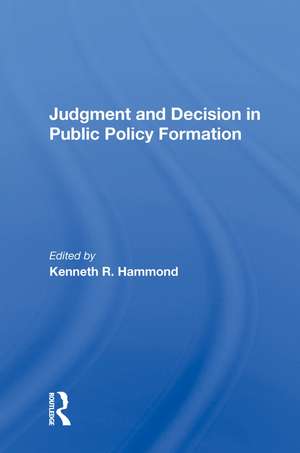Judgment and Decision in Public Policy Formation
Editat de Kenneth R. Hammonden Limba Engleză Hardback – 7 iun 2019
| Toate formatele și edițiile | Preț | Express |
|---|---|---|
| Paperback (1) | 382.87 lei 6-8 săpt. | |
| Taylor & Francis – 23 noi 2020 | 382.87 lei 6-8 săpt. | |
| Hardback (1) | 765.59 lei 6-8 săpt. | |
| Taylor & Francis – 7 iun 2019 | 765.59 lei 6-8 săpt. |
Preț: 765.59 lei
Preț vechi: 1028.21 lei
-26% Nou
Puncte Express: 1148
Preț estimativ în valută:
146.56€ • 150.73$ • 121.59£
146.56€ • 150.73$ • 121.59£
Carte tipărită la comandă
Livrare economică 18 februarie-04 martie
Preluare comenzi: 021 569.72.76
Specificații
ISBN-13: 9780367021016
ISBN-10: 0367021013
Pagini: 198
Dimensiuni: 152 x 229 mm
Greutate: 0.53 kg
Ediția:1
Editura: Taylor & Francis
Colecția Routledge
Locul publicării:Oxford, United Kingdom
ISBN-10: 0367021013
Pagini: 198
Dimensiuni: 152 x 229 mm
Greutate: 0.53 kg
Ediția:1
Editura: Taylor & Francis
Colecția Routledge
Locul publicării:Oxford, United Kingdom
Descriere
From various vantage points the authors consider the topic of judgment and decision in policy formation. Richard Lamm, governor of Colorado, describes the problem of utilizing scientific knowledge in the context of political survival. Joseph Coates, assistant to the director, Congressional Office of Technology Assessment, explores the nature of public policy issues. Kenneth Hammond, director of the Center for the Study of Judgment and decision in Policy Formation at the University of Colorado, describes the competence of thought that can he brought to bear on public policy issues. Paul Slovic, Decision Research Inc., addresses the problem of risk assessment in policy formation from the point of view of a cognitive psychologist. Ward Edwards, director, Social Science Research Institute, University of Southern California, describes the general manner in which decision theory may be applied to policy formation. Kenneth Boulding, program director, Institute of Behavioral Science, University of Colorado, provides an overview of judgment and decision in policy formation. Eillel Einhorn, professor of industrial psychology, University of Chicago, shows the consequences of fallible judgment for social policy formation. Kenneth Hammond and Leonard Adelman provide an example of the application of judgment analysis to a public policy issue.
Cuprins
1. The Environment and Public Policy 2. Toward Increasing Competence of Thought in Public Policy Formation 3. What is a Public Policy Issue? 4. Technology for Director Dubious: Evaluation and Decision in Public Contexts 5. Judgment, Choice, and Societal Risk Taking 6. Observations on Judgment and Public Policy Decisions 7. Science, Values and Human Judgment 8. Decision Errors and Fallible Judgment: Implications for Social Policy
